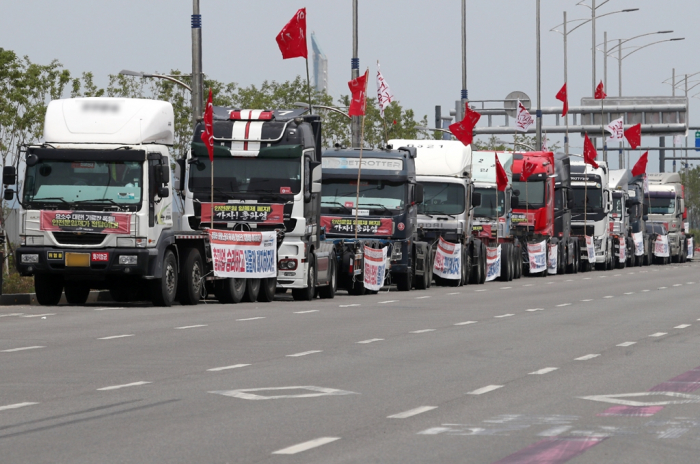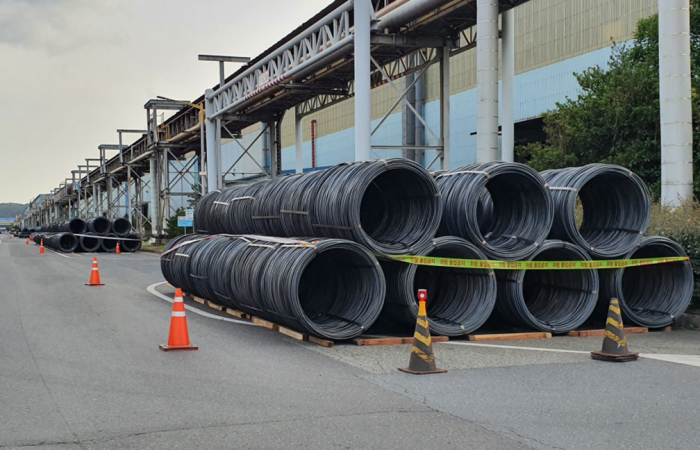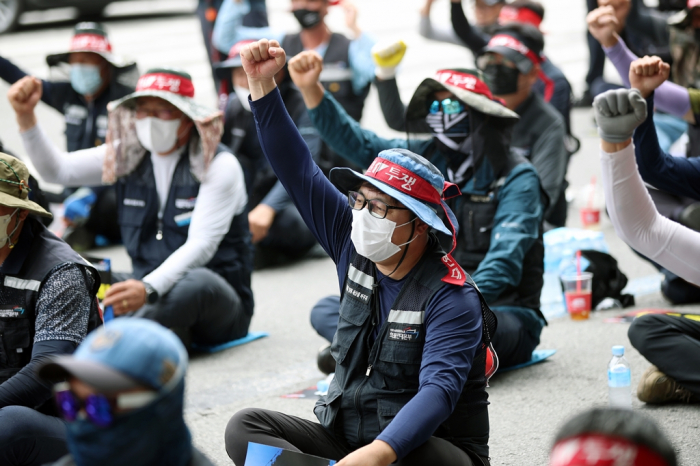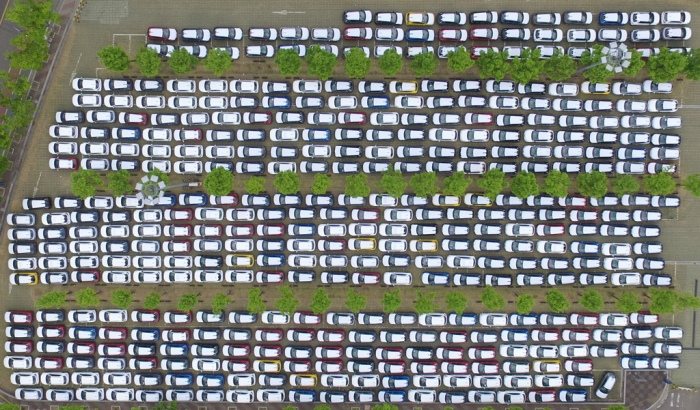Supply chain
Industrial losses balloon as Korean trucker strike enters 7th day
Labor strife, if prolonged, will add to concerns of slower growth and rising inflation, economists warn
By Jun 13, 2022 (Gmt+09:00)
3
Min read
Most Read
LG Chem to sell water filter business to Glenwood PE for $692 million


Kyobo Life poised to buy Japan’s SBI Group-owned savings bank


KT&G eyes overseas M&A after rejecting activist fund's offer


StockX in merger talks with Naver’s online reseller Kream


Mirae Asset to be named Korea Post’s core real estate fund operator



South Korea’s manufacturing sector faces ballooning losses across industries as the trucker strike entered its seventh day on Monday, disrupting shipments and exports amid stalled talks between unionized workers and the government.
The country’s major industries, including auto, steel, petrochemical and cement, saw a combined loss of 1.6 trillion won ($1.25 billion) over the past week due to the strike, according to the trade and industry ministry.
The estimate was based on losses in production, shipment and exports since the strike began on June 7, the ministry said in a statement.
Earlier Monday, negotiations between government officials and unionized truckers collapsed as members of the 22,000-strong Cargo Truckers Solidarity, affiliated with its umbrella group, the Korean Confederation of Trade Unions, continued their walkout, demanding an extension of subsidies, set to expire at year-end, that guarantee minimum wages as fuel prices rise.
Four rounds of talks have failed to find a compromise with the government saying any law change is up to the National Assembly while urging unionized truckers to return to work.

STEELMAKERS, AUTOMAKERS, CEMENT PRODUCERS HIT HARD
Steelmakers are among the companies hit hardest by the strike as POSCO and its local rivals have halted part of their operations due to a lack of space to store unshipped products.
POSCO said its wire rod and cold-rolled steel factories were put on hold from Monday morning.
Korean steelmakers have suffered 450,000 tons of steel production losses worth 697.5 billion won since June 7, according to the ministry.
Some cement makers on Monday suspended their key facilities, called roaster kilns, for the first time in nearly six decades, with their ex-factory shipments plunging by nearly 90%.
According to the Korea Cement Association, Ssangyong C&E Co. and other major cement makers have suffered a combined 77 billion won loss over the past week.

Hyundai Motor Co. and Kia Corp., the country’s two largest automakers, have intermittently halted their production lines, with Hyundai’s plant operating rate falling to half its usual level last week as the company was unable to receive a timely supply of components and transport finished products.
Carmakers have incurred a combined loss of 257.1 billion won due to output disruptions of 5,400 cars since June 7.
Kumho Tire Co., Korea’s second-largest tire maker, said it couldn’t ship products from its three local factories for nearly a week due to the trucker strike, while Hankook Tire & Technology Co., the country’s top tire company, expects its shipments to fall by half.
Petrochemical companies said on Monday they have also joined the automobile and steelmakers in cutting operations due to mounting inventories.
HURTING GLOBAL SUPPLY CHAINS
The strike is feared to deepen uncertainty over global supply chains, already disrupted by China’s toughened COVID-19 restrictions and Russia’s invasion of Ukraine, as Korea is a major supplier of chips, smartphones, cars and other electronics goods.
The Korea International Trade Association said it has received 160 complaints from local companies over production disruptions and delayed overseas shipments due to the trucker strike.

Some freighters had to let go of secured cargo ships as truckers balked at delivering products for export, the association said.
Analysts said prolonged labor strife will likely test President Yoon Suk-yeol, who took office five weeks ago, and add to concerns of slower growth and rising inflation in Korea, Asia’s fourth-largest economy.
At a meeting of presidential secretaries on Monday, President Yoon ordered his staff to work out measures to limit any negative impact of the strike on inflation and economic growth.
Korea’s headline consumer prices rose 5.4% in May from a year earlier, the fastest since August 2008, government data showed last week.
Last week, the Organization for Economic Cooperation and Development (OECD) said it expects Korea’s inflation to hit a 24-year high of 4.8% for the full year, slashing its growth forecast to 2.7% from a December projection of 3%.
Write to Dae-Kyu Ahn, Shin-Young Park and Ik-Hwan Kim at powerzanic@hankyung.com
In-Soo Nam edited this article.
More to Read
-
 EconomyKorea May inflation tops 5% for first time since 2008-09 crisis
EconomyKorea May inflation tops 5% for first time since 2008-09 crisisJun 03, 2022 (Gmt+09:00)
3 Min read -
 Central bankBOK steps up inflation fight with back-to-back rate hikes
Central bankBOK steps up inflation fight with back-to-back rate hikesMay 26, 2022 (Gmt+09:00)
2 Min read -
 EconomyKorea Inc. revises business plans as rising oil prices hit economy
EconomyKorea Inc. revises business plans as rising oil prices hit economyFeb 21, 2022 (Gmt+09:00)
6 Min read -
 EconomyKorean economy nears pre-pandemic level, prompts GDP upgrades
EconomyKorean economy nears pre-pandemic level, prompts GDP upgradesApr 27, 2021 (Gmt+09:00)
2 Min read
Comment 0
LOG IN


